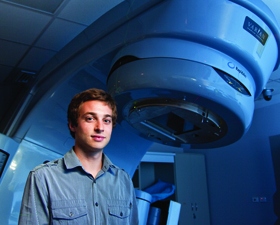
 Dean Paterson
Dean Paterson
Because the last two years of Otago's Radiation Therapy degree is evenly split between theory and practical, Dean felt fully prepared once he graduated ...
Even in a hospital environment, there are few professionals who are able to see as many lives saved as a result of their work as radiation therapists.
One year after graduating with his Bachelor of Health Science, majoring in Radiation Therapy, Dean Paterson is working as a radiation therapist at the Wellington Blood and Cancer Centre, planning and delivering radiation treatments mostly for cancer patients. He describes the work as “immensely satisfying”.
“Perhaps the best thing about this job is the level of rapport that you're able to establish with the patients,” he says. “They are often coming in from Monday to Friday for seven weeks, which means that you can get to know each other in a way that's closer than is possible for most other health professionals.”
And because the last two years of the University of Otago's Radiation Therapy degree is evenly split between theory and practical, on-the-job experience, Dean says he felt fully prepared for the work once he graduated, having already established a good working relationship with his colleagues at the Blood and Cancer Centre.
“Otago was a great environment in which to study,” he says. “In addition to the professional experience you gain, the small classes mean that you get to know your lecturers and fellow students really well and the lecturers are always very approachable.”
Dean is eager to dispel the myth that working with seriously ill patients is “depressing” or difficult. “A lot of our patients really enjoy coming in and knowing they're getting the best available treatment for their condition,” he says. “Most of them are just going about their normal lives, working, enjoying their hobbies and trying to get better.”
